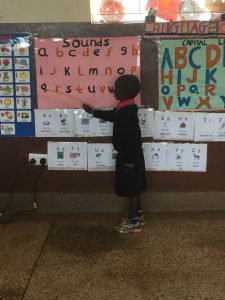 Bonface wanted me to model teaching approaches for all the teachers by taking a class lesson for everyone. After discussion, it was decided that I would focus on an aspect of Scotland to extend the children’s knowledge of the wider world. It was also agreed that a different approach would be needed in Baby class, PP1 and PP2 which are all pre-school. The language barrier would make direct teaching impossible, therefore I would plan a lesson with the teachers and coach them as they delivered it.
Bonface wanted me to model teaching approaches for all the teachers by taking a class lesson for everyone. After discussion, it was decided that I would focus on an aspect of Scotland to extend the children’s knowledge of the wider world. It was also agreed that a different approach would be needed in Baby class, PP1 and PP2 which are all pre-school. The language barrier would make direct teaching impossible, therefore I would plan a lesson with the teachers and coach them as they delivered it.
It was a lot of work but great fun. The pre-school teachers were keen to learn and it was surprising the difference that a little tweak can make to ensure more focused learning. Teacher Catherine was working on extending vocabulary – sight/saying and understanding. All her lessons are a mixture of Maa, Kiswahili and English. She had drawn pictures of a cat, a tree, a table, a ball, the sun, and an apple. I suggested that she focus on vocabulary linked to one context, to help the children learn by making links, rather than having random words eg things found in the class, things found at home, things found in the playground etc. She thought this was a great idea and it meant she could think about what contexts to focus on for the next lessons.
Teacher Sylvia’s lesson was about pupils being able to read short sentences. Instead of her asking one child to read from the board (while everyone else sat in silence) I encouraged her to ask a whole table of pupils to stand up and read simultaneously – then more children would be engaged and she could assess who could actually do it. She had also planned for the follow up exercise (children taking turns to read sentences aloud to each other) to be based on the same sentences she had on the board. I suggested it would be better to use different sentences to confirm who had actually understood.
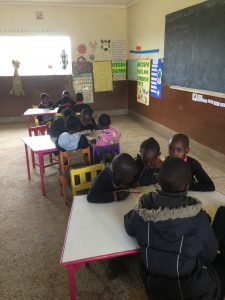
Active learning in PP2
The first lessons I actually delivered were to Classes 1, 2 and 3. Their grasp of English is surprisingly good. We focused on animals that lived in Kenya only, animals that lived in Scotland only and animals that lived in both countries. I had come prepared and made a few Powerpoints with images from Scotland, before coming to Kenya. It saved me a lot of time. The lesson had a lot of active strategies; critical thinking, peer work and use of ICT. I differentiated by questioning and outcome. The pupils responded very well and quickly picked up the new approaches to teaching and learning – which are standard practice in Scotland. The teachers could not believe the difference in term of engagement, understanding and how pupils were beginning to talk about what they were learning. It was an entirely new concept.
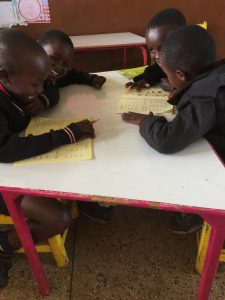
Lessons delivered in Classes, 4, 5, and 6 were based on identifying differences and similarities between Scotland and Kenya. I started the lesson by challenging pupils to tell me something interesting that I didn’t know about their country. I got the usual –it’s hot and dry, there are 47 districts etc. I shook my head. Not good enough, I knew all this already. They were a bit taken aback. As long as you give an answer –you are usually praised. They had never been asked to really think! It took a few moments but they got it! The Maa word for father is Baba, the traditional dress of the Maasai is the Chokka (a tartan cloak that is used as a blanket, coat, table cloth, baby carrier – a bit like a Scottish plaid.) Favourite sports in Kenya include football and rugby, there is a special region in Kenya where all the athletes come from etc. Great stuff!
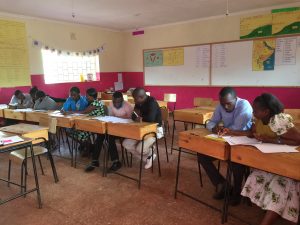 Afterwards, teachers talked about what they had seen. They were impressed and surprised. Not so much at the unfamiliar teaching methods – although they had liked them – but at the children’s response to being challenged. Comments included,
Afterwards, teachers talked about what they had seen. They were impressed and surprised. Not so much at the unfamiliar teaching methods – although they had liked them – but at the children’s response to being challenged. Comments included,
“I didn’t know they could do that.”
“I didn’t know they knew that.”
“Those children were actually thinking today.”
“They are far smarter than I knew.”
Job done!

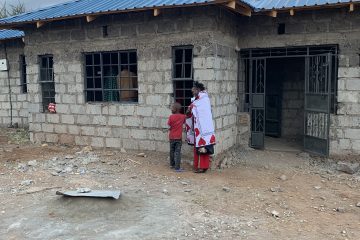
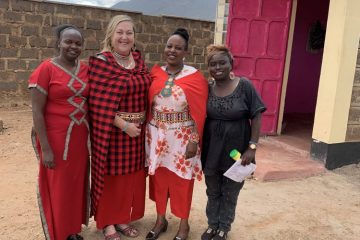
0 Comments